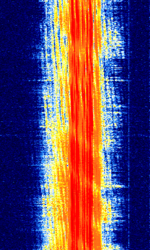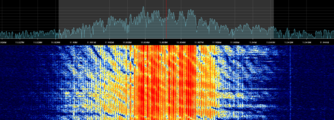Unknown 11p935 suspected broadcast jammer or idling data mode
 | |
|---|---|
| Frequencies | 11.82 MHz,11.915 MHz,11.935 MHz |
| Frequency Range | 11.82 MHz - 11.935 MHz |
| Mode | AM |
| Modulation | — |
| ACF | — |
| Bandwidth | 10 kHz |
| Location | Worldwide |
| Short Description | Suspected broadcast jammer, idling data mode or radar (unlikely) |
| I/Q Raw Recording | Download file |
| Audio Sample | |
This signal has been encountered on several shortwave broadcast frequencies that seem to be related to Chinese or Taiwanese dissident stations or Chinese national radio.
The signal resembles some CISCommonwealth of Independent States (CIS), the former Soviet Republic data modes in idle state. Many tones can be seen on the waterfall spectrum, spaced 120 HzHertz (Hz), unit of frequency, defined as one cycle per second (1 Hz). apart. 120 HzHertz (Hz), unit of frequency, defined as one cycle per second (1 Hz). modulation can also be heard in AMAmplitude Modulation or FMFrequency Modulation mode. Signal bandwidth and the number of tones is somewhat difficult to determine due to splattering, but it is enough to cover a broadcast transmission.
Suspected purposes include:
1) Broadcast jamming. This seems likely as this signal is found on broadcast frequencies that are related to dissident stations.
2) Data transmission, possibly in idle mode. However, it would not make sense to purposefully transmit data on known broadcast frequencies. It has also been seen only in this "idle" mode.
Samples[edit]
AMAmplitude Modulation - broadcast station can be heard in the backgroundFMFrequency Modulation
USBUpper Side Band Modulation (Radio, referring to reception and modulation mode)Universal Serial Bus (Computer, referring to USB Ports and cables), narrow bandwidth, covering the center part of the signal
USBUpper Side Band Modulation (Radio, referring to reception and modulation mode)Universal Serial Bus (Computer, referring to USB Ports and cables), wider bandwidth, covering most of the signal
Frequencies[edit]
11820 kHzKiloHertz (kHz) 10^3 Hz
11915 kHzKiloHertz (kHz) 10^3 Hz
11935 kHzKiloHertz (kHz) 10^3 Hz
Other frequencies may be used.
